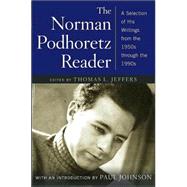
Note: Supplemental materials are not guaranteed with Rental or Used book purchases.
Purchase Benefits
| Contents Introduction by Paul Johnson | |
| A Bibliographical Note | |
| The 1950sEditor's Note | |
| The Adventures of Saul Bellow | |
| Simone de Beauvoir as Novelist | |
| The Know-Nothing Bohemians | |
| Huck Finn's Literary Journey | |
| The 1960sEditor's Note | |
| My Negro Problem -- and Ours | |
| Hannah Arendt on Eichmann | |
| In Defense of Editing | |
| From Making It: The Brutal Bargain | |
| The 1970s | |
| Editor's Note | |
| After Modernism, What? | |
| From Breaking Ranks: Prologue: A Letter to My Son | |
| From Breaking Ranks: Postscript | |
| The 1980s | |
| Editor's Note | |
| J'Accuse | |
| From Why We Were in Vietnam: Whose Immorality? | |
| Kissinger Reconsidered | |
| If Orwell Were Alive Today | |
| An Open Letter to Milan Kundera | |
| The Terrible Question of Aleksandr Solzhenitsyn | |
| The 1990s | |
| Editor's Note | |
| Neoconservatism: A EulogyIsrael -- with Grandchildren | |
| Lolita, My Mother-in-Law, the Marquis de Sade, and Larry Flynt | |
| Philip Roth, Then and Now | |
| What Happened to Ralph Ellison | |
| From Ex-Friends: A Foul-Weather Friend to Norman Mailer | |
| A Dissent on Isaiah Berlin | |
| My New York | |
| Was Bach Jewish? | |
| God and the Scientists | |
| Index | |
| Table of Contents provided by Publisher. All Rights Reserved. |
The New copy of this book will include any supplemental materials advertised. Please check the title of the book to determine if it should include any access cards, study guides, lab manuals, CDs, etc.
The Used, Rental and eBook copies of this book are not guaranteed to include any supplemental materials. Typically, only the book itself is included. This is true even if the title states it includes any access cards, study guides, lab manuals, CDs, etc.